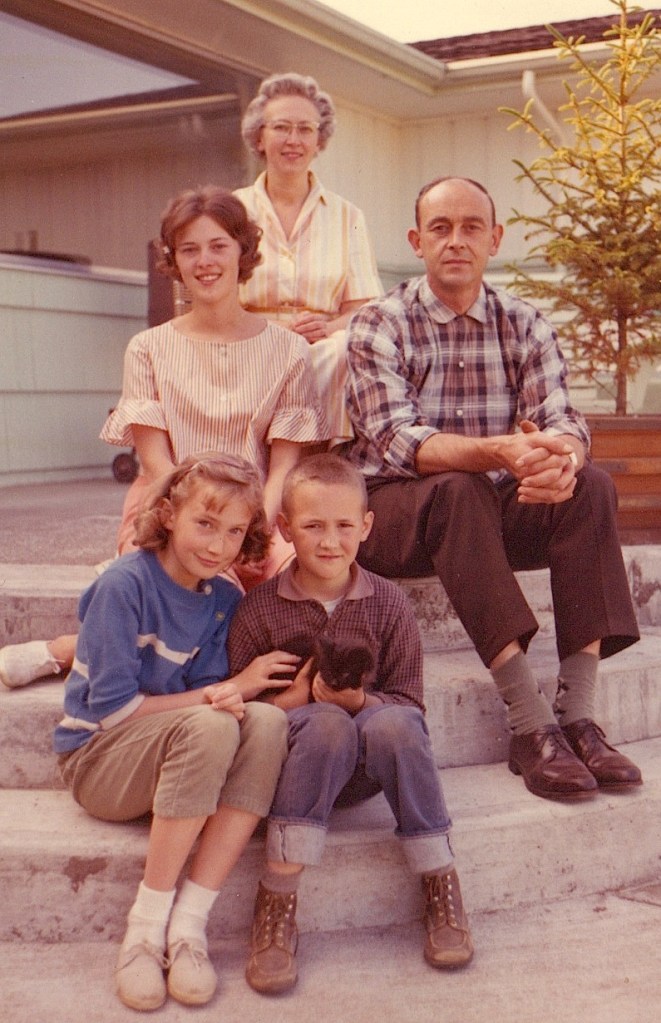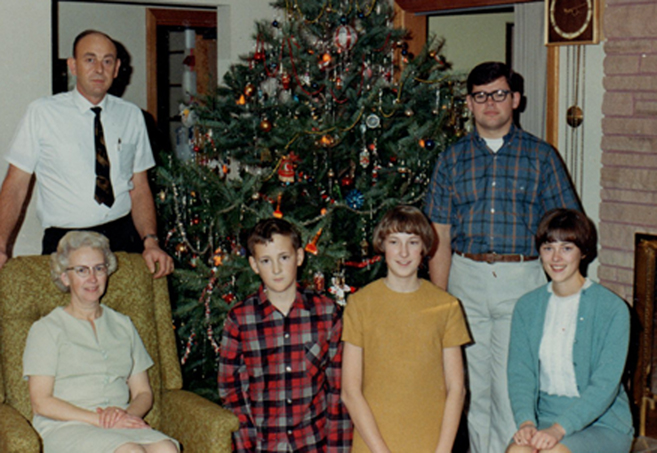
The time is ripe for looking back over the day, the week, the year, and trying to figure out where we have come from and where we are going to, for sifting through the things we have done and the things we have left undone for a clue to who we are and who, for better or worse, we are becoming. We cling to the present out of wariness of the past. But there is a deeper need yet, I think, and that is the need—not all the time, surely, but from time to time—to enter that still room within us all where the past lives on as a part of the present, where the dead are alive again, where we are most alive ourselves to turnings and to where our journeys have brought us. The name of the room is Remember—the room where with patience, with charity, with quietness of heart, we remember consciously to remember the lives we have lived.”
~Frederick Buechner from A Room Called Remember

He was a big man, says the size of his shoes
on a pile of broken dishes by the house;
a tall man too, says the length of the bed
in an upstairs room; and a good, God-fearing man,
says the Bible with a broken back
on the floor below the window, dusty with sun;
but not a man for farming, say the fields
cluttered with boulders and the leaky barn.
A woman lived with him, says the bedroom wall
papered with lilacs and the kitchen shelves
covered with oilcloth, and they had a child,
says the sandbox made from a tractor tire.
Money was scarce, say the jars of plum preserves
and canned tomatoes sealed in the cellar hole.
And the winters cold, say the rags in the window frames.
It was lonely here, says the narrow country road.
Something went wrong, says the empty house
in the weed-choked yard. Stones in the fields
say he was not a farmer; the still-sealed jars
in the cellar say she left in a nervous haste.
And the child? Its toys are strewn in the yard
like branches after a storm—a rubber cow,
a rusty tractor with a broken plow,
a doll in overalls. Something went wrong, they say.
~Ted Kooser, “Abandoned Farmhouse” from Sure Signs: New and Selected Poems.

In 1959, when I was five years old, my father left his high school agriculture teaching position for a new supervisor position with the state.
I didn’t understand at the time the reasons for his leaving his job after 13 years.
Our family moved from a large 3 story farm house in a rural community to a 1950’s newer rambler style home just outside the city limits of the state capitol. It was a big adjustment to move to a much smaller house without a basement or upper story, no garage, and no large haybarn nor chicken coop. It meant most things we owned didn’t make the move with us.
The rambler had two side by side mirror image rooms as the primary central living space between the kitchen on one side and the hallway to the bedrooms on the other. The living room could only be entered through the front door and the family room was accessed through the back door with a shared sandstone hearth in the center, containing a fireplace in each room. The only opening between the rooms had a folding door shut most of the year. In December, the door was opened to accommodate a Christmas tree, so it sat partially in the living room and depending on its generous width, spilled over into the family room. That way it was visible from both rooms, and didn’t take up too much floor space.
The living room, because it contained the only carpeting in the house, and our “best” furniture, was strictly off-limits. In order to keep our two matching sectional knobby gray fabric sofas, a green upholstered chair and gold crushed velvet covered love seat in pristine condition, the room was to be avoided unless we had company. The carpet was never to develop a traffic pattern, there would be no food, beverage, or pet ever allowed in that room, and the front door was not to be used unless a visitor arrived. The hearth never saw a fire lit on that side because of the potential of messy ashes or smoke smell. This was not a room for laughter, arguments or games and certainly not for toys. The chiming clock next to the hearth, wound with weighted cones on the end of chains, called out the hours without an audience.
One week before Christmas, a tree was chosen to fit in the space where it could overflow into the family room. I particularly enjoyed decorating the “family room” side of the tree, using all my favorite ornaments that were less likely to break if they fell on the linoleum floor on that side of the door.
It was as if the Christmas tree became divided, with a “formal” side in the living room and a “real life” face on the other side where the living (and hurting) was actually taking place.
The tree straddled more than just two rooms. Every year that tree’s branches reached out to shelter a family that was slowly, almost imperceptibly, falling apart, like the fir needles dropping to the floor to be swept away. Something was going wrong.
Each year since, the Christmas tree bearing those old ornaments from my childhood reminds me of a still room of mixed memories within me. I am no longer wary of the past, and when I sweep up the fir needles that inevitably drop, I no longer weep.


Love you
LikeLiked by 1 person
Lump-in-the-throat beautiful.
LikeLiked by 1 person
You write so descriptively it’s like the sorrow is my own sorrow.
LikeLiked by 1 person
Go back to the country! City is not all it’s cracked up to be, esp. i this case!
LikeLike
Understand! Completely.
Some memories never die, Some people think that they are buried forever.
I am not sure at this point in my life…. Some are deeply buried just beneath the surface,
like it or not. They can be bittersweet – part of the good that has helped us to grow and survive…
So, really, I do not know if that is a constructive realistic idea or not.
Does re-living those soul- searing times help or not? That would depend on what you do with
the hurt in relation to others in your life as you interact with them.. I try to believe that, sad or not,
they give us an idea of where we have grown, forgiven or not — or still holding on to the bad memories.
For me it is, and has been, for the last 40 years,
my answer, my SOURCE for help in seeking healing from THE only HEALER whom I know and trust!
Emily, it is very obvious to me as a long-time reader of your blog that your outreach mission by your faithful,
loving faith-driven stewardship has reached untold persons in pain and doubt in this hurting world. Especially,
since you are so honest in sharing your own experiences — many that truly reflect what they endure throughout
their Journey.
As one of those persons, I thank you for that.
LikeLiked by 1 person
Thank you, Alice, for reminding me again and again
LikeLike
Thomas, the Thomas we call Doubting Thomas — one of the twelve who was with Jesus for three years, who watched when He preached, and when He healed, when He loved the most damaged folks back to their families, communities, and synagogues, and when He performed miracles that could not be denied — was unable to believe that his teacher had risen from the dead. Until he saw Jesus’ wounds. What does this mean? A lot of things, of course, but maybe the most direct takeaway is that when we share our wounds we become believable. Barriers come down, truth is revealed. And that is glorious, as is your story.
LikeLiked by 1 person
I, too, grew up in a family that fell apart (Dad left). By sharing your scars, you help the rest of us to heal. Thank you, Emily.
I like this last line from a poem by Dick Allen called “Solace”: “No voice once heard is ever lost.” It reminds me that despite our past and/or our circumstances, doing the right thing and saying the right thing can reverberate for years to come and bless someone we’ve never met.
LikeLiked by 1 person